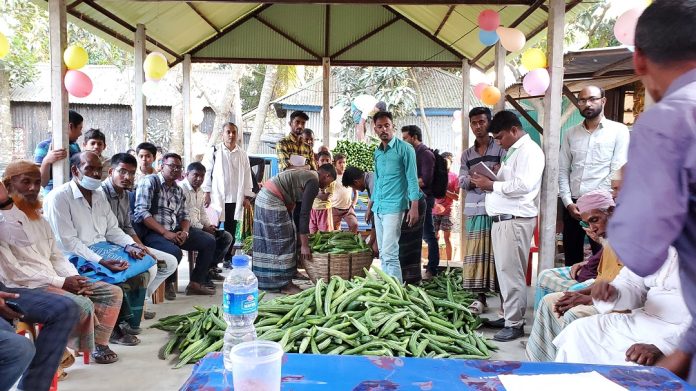The Haor region is a unique area in the Northeast of Bangladesh, where the PPEPP-EU project has a significant presence, particularly in the Kishoreganj district. The region is characterised by its distinct ecosystem, which includes flash floods and standing water bodies that persist for months. These conditions pose significant challenges to extremely poor households, limiting their livelihood options and access to potable water and sanitation as the region remains underwater for nearly half the year.
Many of these Haor inhabitants live in ‘Hatty’, a raised island with a very congested cluster of houses with little or no hygiene and sanitation. They live in these facilities, often with their livestock, and get minimal or no employment opportunities during monsoon season. In response, the male household members temporarily migrate to other parts of the country in search of work.
Despite the odds, the Haor region is naturally a land of substantial agricultural opportunities for its inhabitants. Utilising the indigenous knowledge of Haor’s locals, the PPEPP-EU project aims to create stories of climate resilience by setting up sustainable livelihood options for its participant households and enhancing their capacity to adapt to ever-changing climatic conditions.
In the post-monsoon period, when the water body and run-off cascade down and the land rises again, the season becomes suitable for agriculture, and members engage in Robi crops cultivation such as Boro rice and maise. PPEPP-EU supports the member households to grow high-yielding varieties of rice (e.g. BRRI Dhan 84, 88, 89 and 92) that can cope with Haor’s unique climatic nature and grow fast for a quick harvest before the onset of the flash flood.
With appropriate guidance and hands-on mentorship by the project’s technical staff, these households have changed their cropping pattern from single to double-crop cultivation. In recent years, many of them have shown success in cultivating hybrid maise and vegetables such as sweet potato, pumpkin, and chilli tolerant to alluvium and Haor climates before the Robi crop season. They grow vegetables vertically on an entresol adjacent to the ‘Hatty’ on low land to keep safe from standing water bodies in the monsoon.
Cow fattening is another profitable livelihood option for these households in the dry season. Members buy a two-year-old cow, rear it for four to six months and then sell it for a profit before the full monsoon arrives in the region. Many Haor households keep 2-3 high-yielding dairy cows and produce milk which is mostly destined for cheese making. The famous Dhaka Cheese comes from this region. They also engage in other livelihood activities, such as sheep, duck, and pigeon rearing at the homestead, small-scale fish processing and fermentation, fishing gear production, and cultivation of high-yield grass (e.g., Napier grass). PPEPP-EU members also use a new technique called silage to preserve green grass, straw, and maise leaves to help feed their livestock during the wet season when fresh grass is unavailable.
Appropriate backward and forward linkages for farmers and producers are equally crucial to creating a sustainable livelihood opportunity in Haor’s adverse climatic and infrastructural conditions. Considering the market linkage opportunity for the local community, PPEPP-EU has installed the ‘Agriculture Services and Marketing Hub’ in different working unions of the Haor region.
Shamsuzzaman, the husband of PPEPP-EU member Khadiza Begum, looks after a similar hub at Kamarpasha Union in Kishoreganj. “We are getting great responses from the local farmers as they sell their milk, vegetables, and other produce from this hub throughout the day. While many sell their fish in the season, others sell the required raw materials for production in the evening throughout the year, keeping the hub busy from dawn to dusk. Every day, one or two pick-up vans transport these products directly to the Karwan Bazar in Dhaka,” said Shamsuzzaman.
As PPEPP-EU continues to establish more hubs in the most remote corners of Haor in the coming days, more others are expected to be inspired to engage in potential livelihood activities and reap the benefits of these market hubs.


